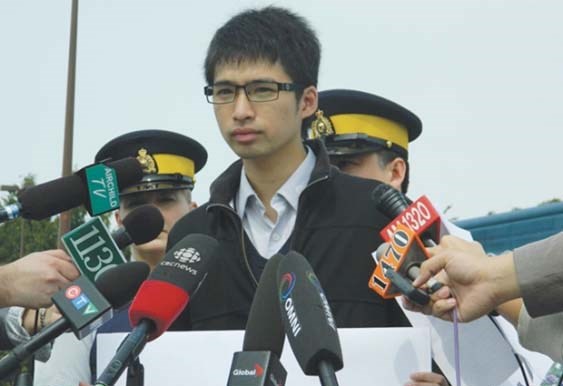Following one of the longest-ever jury deliberations in B.C., a man who used a hammer to beat his mother to death and then stuffed her body in a suitcase has been convicted of second-degree murder.
The verdict Thursday by a B.C. Supreme Court jury in the case of Yuan Xi Tang, 28, came after 11 days of deliberations and after the jury had been reduced to 10 members from 12 members. If another juror had been discharged, there would have been a mistrial.
After the tired-looking jury rendered their verdict, B.C. Supreme Court Justice William Ehrcke asked them to make a recommendation on parole eligibility.
Second-degree murder carries a mandatory sentence of life in prison with no parole eligibility of between 10 and 25 years.
After about 15 minutes, the jury returned and said four jurors recommended a 25-year period of parole ineligibility, three recommended 20 years, two called for 15 years and one recommended 10 years. A date for a sentencing hearing will be fixed Nov. 20.
The accused had little reaction to the verdict as he sat in the prisoner’s dock.
The judge expressed his thanks to the jury, saying they had undertaken their duty diligently and conscientiously.
“I know this has been a long trial, both in terms of evidence and deliberations. Everyone in this case knows how hard you have worked.”
Tang had pleaded not guilty to first-degree murder in the June 2012 death of his mom, Lianjie Guo, 47, but admitted to the jury that he had committed the lesser and included offence of second-degree murder.
The only issue for the jury was whether Tang’s grisly crime was first- or second-degree murder.
During their deliberations, the jury came back with several questions about the elements of first-degree murder, which requires the Crown to prove there was deliberation and planning by the accused.
On Monday, the eighth day of deliberations, the jury indicated they could not reach a verdict, but Ehrcke exhorted them to continue their efforts.
During the trial, the jury had been shown video of the accused confessing to undercover police officers that he’d killed his mother because she was too controlling and had abused him physically and verbally.
Tang was “exiled” to Canada to get an education after his parents had cut him off from his girlfriend in China, who they believed was too poor to marry their son, the jury heard.
On the day that his parents were to return to China after visiting him at a rooming house in Richmond, Tang took a hammer and struck his mother over the head.
When she was not rendered unconscious and appeared to be struggling, he put some bedding over her head and struck her twice more on the head with the hammer.
Tang placed the body in a suitcase and stored it in a storage locker before driving to the No. 2 Road Bridge.
He walked to the centre of the bridge and threw the hammer as far as he could out into the Fraser River.
Fearing that passing vehicles would spot him if he tried to dump the suitcase into the river from the middle of the bridge, he waded into the water underneath the bridge and pushed the suitcase out into the water as far as he could.
Tang told his father only that his mother was missing, and the matter was reported to police as a missing person’s case.
Tang and his dad then went public, appealing for help and putting up posters.
Six weeks later the suitcase washed up on a beach near Powell River. Police then staged an undercover operation in which two cops approached Tang, posing as gangsters who had discovered the suitcase while fishing.
When the undercover cops showed Tang a photo of the suitcase, he confessed in great detail to the crime. He told the cops a number of times that he’d planned the murder.
After his arrest, Tang confessed to the crime to an undercover police officer in his prison cell, a so-called “cell plant” operation. The accused also admitted to the crime to an officer interviewing him.
In his testimony, Tang claimed that he only intended to kill his mother after he had struck her the first time with the hammer, making it second-degree murder. He denied that he had planned and deliberated upon the slaying.
What the jury didn’t hear was that Tang faces a second charge of counselling to commit the murder of his father. A trial on that charge is scheduled for March.
Part way through the trial, the 12-member jury was reduced to 11 members when one of the jurors brought his medicinal marijuana into the jury room and the odour of the pot was detected by sheriffs.
The judge conducted an inquiry and dismissed the male juror, who cannot be identified under Canadian law, and who told the court that he used the drug for back pain and insomnia. He was dismissed after failing to produce a certificate proving he was authorized to have the drugs.
That same day, judge declined to dismiss a second juror who reported that his family had socialized with one of the cops peripherally involved in the undercover police operation but not called as a Crown witness at trial.
The longest jury deliberation was 12 days for the Greeks murder trial in 2012. In 1997, a jury deliberated for nine days before a verdict in the Gustafsen Lake native standoff.



